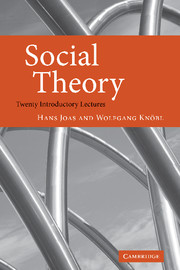Book contents
- Frontmatter
- Dedication
- Contents
- Introduction
- I What is theory?
- II The classical attempt at synthesis: Talcott Parsons
- III Parsons on the road to normativist functionalism
- IV Parsons and the elaboration of normativist functionalism
- V Neo-utilitarianism
- VI Interpretive approaches (1): symbolic interactionism
- VII Interpretive approaches (2): ethnomethodology
- VIII Conflict sociology and conflict theory
- IX Habermas and critical theory
- X Habermas' ‘theory of communicative action’
- XI Niklas Luhmann's radicalization of functionalism
- XII Anthony Giddens' theory of structuration and the new British sociology of power
- XIII The renewal of Parsonianism and modernization theory
- XIV Structuralism and poststructuralism
- XV Between structuralism and theory of practice: The cultural sociology of Pierre Bourdieu
- XVI French anti-structuralists (Cornelius Castoriadis, Alain Touraine and Paul Ricoeur)
- XVII Feminist social theories
- XVIII A crisis of modernity? New diagnoses (Ulrich Beck, Zygmunt Bauman, Robert Bellah, and the debate between liberals and communitarians)
- XIX Neo-pragmatism
- XX How things stand
- References
- Author index
- Subject index
XI - Niklas Luhmann's radicalization of functionalism
Published online by Cambridge University Press: 05 June 2014
- Frontmatter
- Dedication
- Contents
- Introduction
- I What is theory?
- II The classical attempt at synthesis: Talcott Parsons
- III Parsons on the road to normativist functionalism
- IV Parsons and the elaboration of normativist functionalism
- V Neo-utilitarianism
- VI Interpretive approaches (1): symbolic interactionism
- VII Interpretive approaches (2): ethnomethodology
- VIII Conflict sociology and conflict theory
- IX Habermas and critical theory
- X Habermas' ‘theory of communicative action’
- XI Niklas Luhmann's radicalization of functionalism
- XII Anthony Giddens' theory of structuration and the new British sociology of power
- XIII The renewal of Parsonianism and modernization theory
- XIV Structuralism and poststructuralism
- XV Between structuralism and theory of practice: The cultural sociology of Pierre Bourdieu
- XVI French anti-structuralists (Cornelius Castoriadis, Alain Touraine and Paul Ricoeur)
- XVII Feminist social theories
- XVIII A crisis of modernity? New diagnoses (Ulrich Beck, Zygmunt Bauman, Robert Bellah, and the debate between liberals and communitarians)
- XIX Neo-pragmatism
- XX How things stand
- References
- Author index
- Subject index
Summary
Niklas Luhmann was the other major figure within German sociology who, like Jürgen Habermas, was unwilling to accept the theoretical diversity apparent from the 1960s on, which we have described in the previous lectures, and strove instead to achieve a new synthesis of his own. Admittedly, we cannot take the word ‘synthesis’ too literally in Luhmann's case. Habermas, in an enormous hermeneutic effort, did in fact attempt to comprehend the various theoretical schools and preserve those insights he considered valid while developing his own theoretical construct in such a way that certain elements of these ‘source theories’ remained quite apparent in its architecture. Luhmann, meanwhile, took a far more direct approach. He lacked the grasp of hermeneutics that is such a major feature of Habermas' work. Rather, he endeavoured to evade or reformulate the key concerns of the competing theoretical schools within sociology – with the help of a functionalism markedly more radical than that of Parsons. From the very beginning Luhmann made use of the functionalist method of analysis, which he gradually turned into a kind of ‘super theory’ as his work developed over time and with which he attempted to assert his claim to synthesis or, we might better say, comprehensiveness. Thus, in comparison to that of Habermas, Luhmann's oeuvre developed in amazingly straightforward fashion. Though Luhmann himself and his supporters have been talking about a theoretical reconstruction (the ‘autopoietic turn’, which we shall look at later) since the early 1980s, the foundations of his theory have remained unchanged.
- Type
- Chapter
- Information
- Social TheoryTwenty Introductory Lectures, pp. 249 - 280Publisher: Cambridge University PressPrint publication year: 2009



